12法律英语三习题题库
法律英语练习题答案
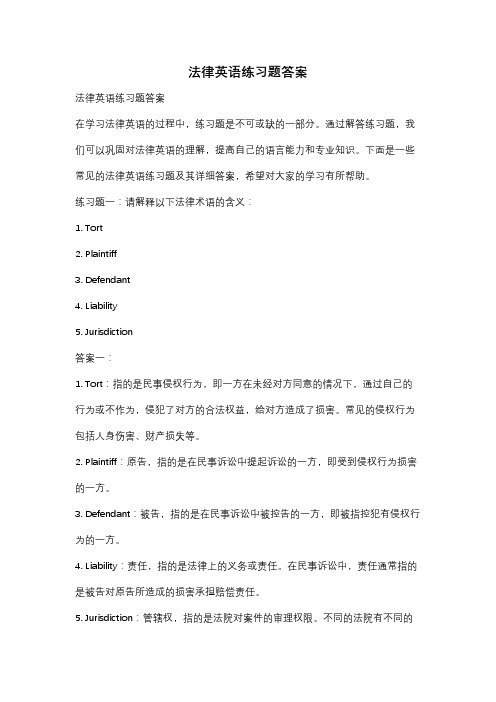
法律英语练习题答案法律英语练习题答案在学习法律英语的过程中,练习题是不可或缺的一部分。
通过解答练习题,我们可以巩固对法律英语的理解,提高自己的语言能力和专业知识。
下面是一些常见的法律英语练习题及其详细答案,希望对大家的学习有所帮助。
练习题一:请解释以下法律术语的含义:1. Tort2. Plaintiff3. Defendant4. Liability5. Jurisdiction答案一:1. Tort:指的是民事侵权行为,即一方在未经对方同意的情况下,通过自己的行为或不作为,侵犯了对方的合法权益,给对方造成了损害。
常见的侵权行为包括人身伤害、财产损失等。
2. Plaintiff:原告,指的是在民事诉讼中提起诉讼的一方,即受到侵权行为损害的一方。
3. Defendant:被告,指的是在民事诉讼中被控告的一方,即被指控犯有侵权行为的一方。
4. Liability:责任,指的是法律上的义务或责任。
在民事诉讼中,责任通常指的是被告对原告所造成的损害承担赔偿责任。
5. Jurisdiction:管辖权,指的是法院对案件的审理权限。
不同的法院有不同的管辖权,根据案件的性质、金额等因素来决定哪个法院有权审理该案件。
练习题二:请将以下英文法律名词翻译成中文:1. Contract2. Arbitration3. Injunction4. Intellectual property5. Negligence答案二:1. 合同2. 仲裁3. 禁令4. 知识产权5. 过失练习题三:请解释以下法律原则的含义:1. Presumption of innocence2. Due process3. Burden of proof4. Reasonable doubt5. Double jeopardy答案三:1. Presumption of innocence:无罪推定,指的是在刑事诉讼中,被告在未被证明有罪之前,应被认定为无罪。
法律英语练习题答案
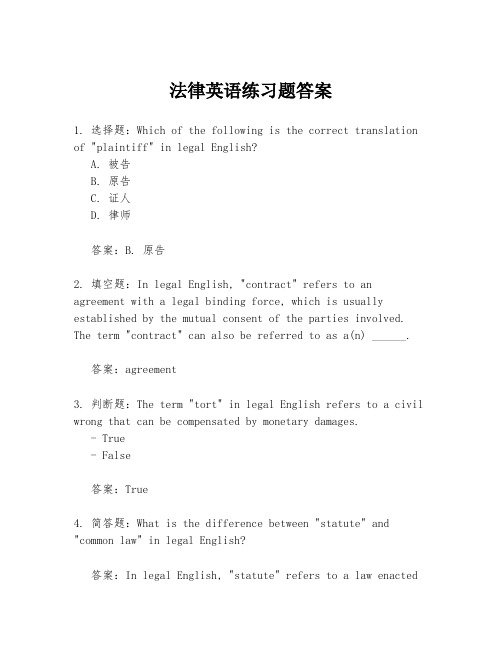
法律英语练习题答案1. 选择题:Which of the following is the correct translation of "plaintiff" in legal English?A. 被告B. 原告C. 证人D. 律师答案:B. 原告2. 填空题:In legal English, "contract" refers to an agreement with a legal binding force, which is usually established by the mutual consent of the parties involved. The term "contract" can also be referred to as a(n) ______.答案:agreement3. 判断题:The term "tort" in legal English refers to a civil wrong that can be compensated by monetary damages.- True- False答案:True4. 简答题:What is the difference between "statute" and "common law" in legal English?答案:In legal English, "statute" refers to a law enactedby a legislative body, whereas "common law" refers to the body of law derived from judicial decisions of courts and similar tribunals.5. 翻译题:请将以下句子翻译成英文。
法律英语教程课后练习题含答案

法律英语教程课后练习题含答案本文是法律英语教程课后练习题的答案文档,共计包含6道练习题,每个练习题都要求以英语书写,旨在提高法律英语的水平。
练习题1What is the difference between litigation and arbitration?答案Litigation involves a lawsuit in a court of law, where a judge or a jury decides the outcome of the dispute. Arbitration, on the other hand, is a process in which two parties agree to have a neutral third party hear their dispute and render a decision. The decision is binding and may not be appealed.练习题2What is a contract?答案A contract is a legally binding agreement between two or moreparties that creates obligations that are enforceable by law. Each party in a contract agrees to perform certn obligations in exchange for some form of consideration.练习题3What is a tort?A tort is a civil wrong that causes harm or injury to another person or property. Examples of torts include negligence, defamation, invasion of privacy, and intentional infliction of emotional distress.练习题4What is intellectual property?答案Intellectual property refers to creations of the mind, such as inventions, literary and artistic works, designs, symbols, and names used in commerce. The law protects intellectual property through patents, trademarks, and copyrights.练习题5What is a trademark?答案A trademark is a symbol, word, phrase, or design that identifies and distinguishes the goods or services of one party from those of another. Trademarks are protected by law and can be registered with the government.练习题6What is the difference between a felony and a misdemeanor?A felony is a serious crime that is punishable by imprisonment in a state or federal prison for more than a year. Examples of felonies include murder, robbery, and drug trafficking. A misdemeanor, on the other hand, is a less serious crime that is punishable by a fine or imprisonment in a local jl for up to a year. Examples of misdemeanors include traffic violations, disorderly conduct, and petty theft.以上是本文的6道法律英语练习题及答案,希望对您的法律英语学习有所帮助。
法律专业英语试题及答案

法律专业英语试题及答案一、选择题(每题1分,共10分)1. Which of the following is a fundamental principle of the legal system?A. EqualityB. JusticeC. FairnessD. All of the above2. The term "judiciary" refers to:A. The legislative branch of governmentB. The executive branch of governmentC. The branch of government responsible for interpreting and applying the lawD. The branch of government responsible for enforcing laws3. In the context of contract law, what is "consideration"?A. The thought process behind a contractB. The legal element that something of value is exchangedC. The written document of a contractD. The person who is bound by the contract4. What is the term for the legal principle that a person cannot be tried or punished twice for the same offense?A. Double jeopardyB. MitigationC. RecidivismD. Proportionality5. Which of the following is a type of legal document?A. DeedB. NovelC. MemoD. Invoice6. The term "pro se" means:A. Against oneselfB. On behalf of oneselfC. On behalf of anotherD. Against another7. What is the difference between "civil law" and "criminal law"?A. Civil law deals with disputes between individuals, while criminal law deals with offenses against the state.B. Criminal law deals with disputes between individuals, while civil law deals with offenses against the state.C. Both deal with offenses against the state.D. Both deal with disputes between individuals.8. What does the term "habeas corpus" mean?A. A writ requiring a person to be brought before a courtB. A legal document that ends a lawsuitC. A legal document that begins a lawsuitD. A writ that allows a person to be detained withouttrial9. In legal terms, "precedent" refers to:A. A legal principle or rule established in a previouscaseB. A legal document that is used as evidenceC. A legal principle that is always followed without exceptionD. A legal principle that is never followed10. What is the term for a legal dispute between two or more parties?A. LitigationB. MediationC. ArbitrationD. Negotiation二、填空题(每题1分,共5分)11. The legal principle of "innocent until proven guilty" is known as ________.12. A person who is not a lawyer but represents themselves in court is said to be acting ________.13. The process of a court determining the rights and obligations of parties in a dispute is called ________.14. A legal document that outlines the terms of a contract is known as a(n) ________.15. The area of law dealing with disputes over property is known as ________.三、简答题(每题5分,共10分)16. Explain the concept of "estoppel" in legal terms.17. What are the key differences between "common law" and "civil law" systems?四、案例分析题(每题15分,共15分)18. A company has been accused of breaching a contract with a supplier. The supplier claims that the company has failed to pay for goods delivered. The company argues that the goods were not delivered as per the agreed terms. Analyze the situation from a legal perspective, considering theprinciples of contract law.五、论述题(每题20分,共20分)19. Discuss the role of the judiciary in a democratic society and its importance in upholding the rule of law.答案:一、1. D2. C3. B4. A5. A6. B7. A8. A9. A10. A二、11. Presumption of innocence12. Pro se13. Adjudication14. Contract15. Property law三、16. Estoppel is a legal principle that prevents a person from asserting a claim or right that contradicts a previous position or statement they have made, especially when it would be unfair to allow them to do so.17. Common law systems rely heavily on judicial precedent, while civil law systems are based on comprehensive written codes. Common law is primarily developed through case law, whereas civil law is developed through legislative statutes.四、18. In this case, the supplier would need to provide evidence of the contract and proof of delivery of the goods. The company would need to show that the goods were not delivered according。
法律英语考试试题及答案
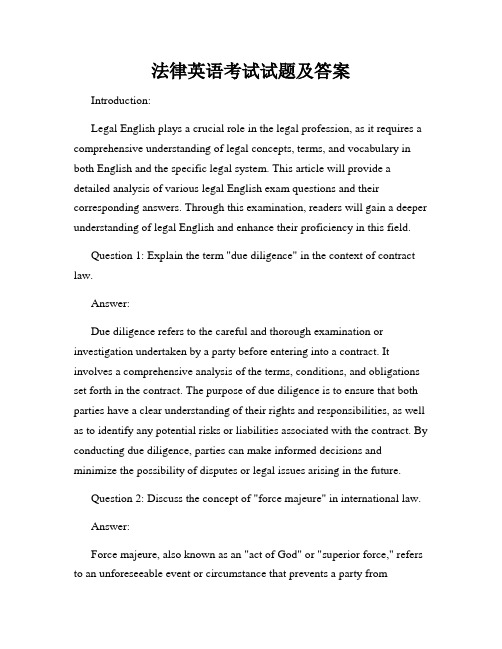
法律英语考试试题及答案Introduction:Legal English plays a crucial role in the legal profession, as it requires a comprehensive understanding of legal concepts, terms, and vocabulary in both English and the specific legal system. This article will provide a detailed analysis of various legal English exam questions and their corresponding answers. Through this examination, readers will gain a deeper understanding of legal English and enhance their proficiency in this field.Question 1: Explain the term "due diligence" in the context of contract law.Answer:Due diligence refers to the careful and thorough examination or investigation undertaken by a party before entering into a contract. It involves a comprehensive analysis of the terms, conditions, and obligations set forth in the contract. The purpose of due diligence is to ensure that both parties have a clear understanding of their rights and responsibilities, as well as to identify any potential risks or liabilities associated with the contract. By conducting due diligence, parties can make informed decisions and minimize the possibility of disputes or legal issues arising in the future.Question 2: Discuss the concept of "force majeure" in international law.Answer:Force majeure, also known as an "act of God" or "superior force," refers to an unforeseeable event or circumstance that prevents a party fromfulfilling its contractual obligations. These events are typically beyond the control of the party involved and cannot be reasonably anticipated or avoided. Examples of force majeure events may include natural disasters, wars, riots, or government actions. In international law, force majeure clauses are commonly included in contracts to protect parties from the consequences of unforeseen events. These clauses typically provide relief or exemption from contractual obligations in the event that a force majeure event occurs, allowing the affected party to suspend or terminate their obligations under the contract.Question 3: Define the term "judicial precedent" in common law systems.Answer:Judicial precedent, also known as stare decisis, is a fundamental principle in common law systems. It refers to the legal doctrine in which the decisions made by higher courts become binding on lower courts within the same jurisdiction. Under this principle, lower courts must follow the legal reasoning and interpretations of the higher courts in previous cases that are similar in nature. Judicial precedent ensures consistency, predictability, and stability in the legal system, as it allows for the uniform application of the law and the development of legal principles over time. However, it is important to note that judicial precedent can be overruled or distinguished when there are significant differences in factual circumstances or legal principles involved.Question 4: Explain the concept of "vicarious liability" in tort law.Answer:Vicarious liability is a legal principle that holds one party responsible for the actions or omissions of another party, even if they themselves did not commit any wrongdoing. This concept often arises in employer-employee relationships, where employers can be held liable for the actions of their employees performed within the scope of their employment. Vicarious liability is based on the idea that employers have a duty of care to ensure that their employees act responsibly and do not cause harm to others. By imposing vicarious liability, the law aims to provide a remedy for victims and encourage employers to exercise proper control and supervision over their employees.Conclusion:Understanding legal English is crucial for professionals in the legal field, as it enables effective communication and interpretation of legal concepts and principles. This article has provided an insightful analysis of various legal English exam questions, encompassing contract law, international law, common law systems, and tort law. By gaining a comprehensive understanding of these topics, aspiring legal professionals can enhance their knowledge and proficiency in legal English, thus paving the way for successful careers in the legal industry.。
法律英语课后练习题含答案 (2)
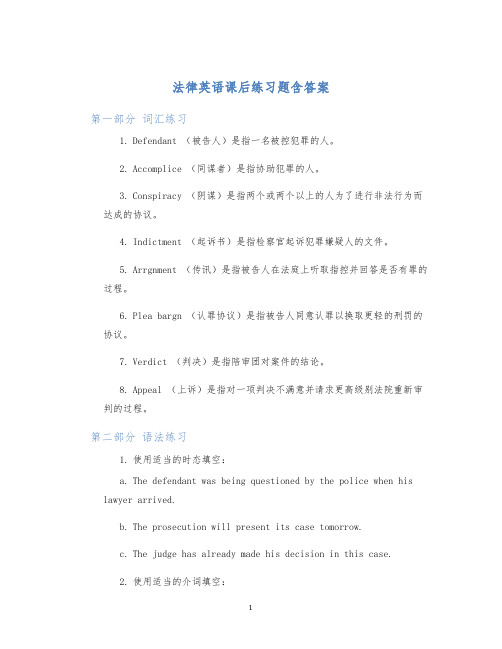
法律英语课后练习题含答案第一部分词汇练习1.Defendant (被告人)是指一名被控犯罪的人。
2.Accomplice (同谋者)是指协助犯罪的人。
3.Conspiracy (阴谋)是指两个或两个以上的人为了进行非法行为而达成的协议。
4.Indictment (起诉书)是指检察官起诉犯罪嫌疑人的文件。
5.Arrgnment (传讯)是指被告人在法庭上听取指控并回答是否有罪的过程。
6.Plea bargn (认罪协议)是指被告人同意认罪以换取更轻的刑罚的协议。
7.Verdict (判决)是指陪审团对案件的结论。
8.Appeal (上诉)是指对一项判决不满意并请求更高级别法院重新审判的过程。
第二部分语法练习1.使用适当的时态填空:a.The defendant was being questioned by the police when hislawyer arrived.b.The prosecution will present its case tomorrow.c.The judge has already made his decision in this case.2.使用适当的介词填空:a.The lawyer was confident in his client’s innocence.b.The defendant was charged with murder.c.The prosecution presented strong evidence agnst thedefendant.3.选择合适的词填空:a.The defense attorney argued that the prosecution did nothave ____ (sufficient / efficient) evidence to prove their case.b.The judge declared a ____ (mistrial / mistrust) due to jurymisconduct.c.The defendant decided to plead guilty in exchange for a ____(lighter / lighter) sentence.第三部分阅读理解For many years, a defendant’s right to a speedy trial has been an important part of the American legal system. This right is guaranteed by the Sixth Amendment to the Constitution, which states that。
法律英语试卷试题及答案
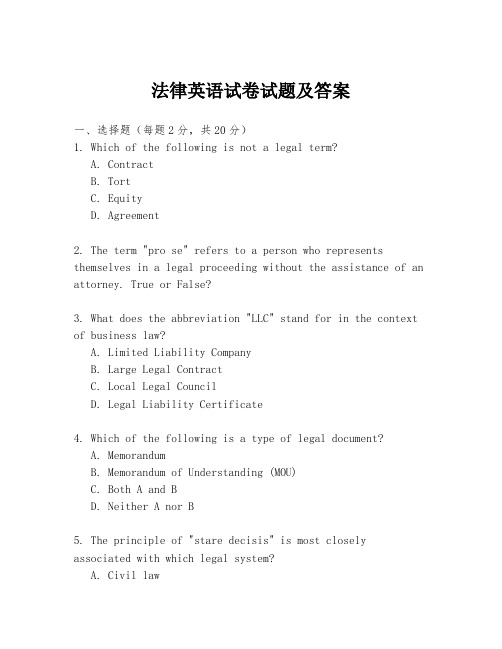
法律英语试卷试题及答案一、选择题(每题2分,共20分)1. Which of the following is not a legal term?A. ContractB. TortC. EquityD. Agreement2. The term "pro se" refers to a person who represents themselves in a legal proceeding without the assistance of an attorney. True or False?3. What does the abbreviation "LLC" stand for in the context of business law?A. Limited Liability CompanyB. Large Legal ContractC. Local Legal CouncilD. Legal Liability Certificate4. Which of the following is a type of legal document?A. MemorandumB. Memorandum of Understanding (MOU)C. Both A and BD. Neither A nor B5. The principle of "stare decisis" is most closely associated with which legal system?A. Civil lawB. Common lawC. Religious lawD. International law6. What is the term for the legal process of resolving disputes outside the court system?A. LitigationB. MediationC. ArbitrationD. Negotiation7. In the context of intellectual property law, "patent" refers to:A. A right to exclude others from making, using, or selling an inventionB. A document that grants ownership of a work of literature or artC. A legal document that protects a brand name or logoD. A license to practice a profession8. Which of the following is a fundamental principle of criminal law?A. Presumption of innocenceB. Right to a fair trialC. Both A and BD. Neither A nor B9. The term "precedent" in legal English refers to:A. A legal principle or rule established in a previous case that is binding in courtB. A document that outlines the facts of a caseC. A legal agreement between partiesD. A formal request for a court to review a case10. What does the term "actus reus" mean in criminal law?A. The guilty mindB. The wrongful actC. The criminal intentD. The legal defense二、填空题(每空1分,共10分)11. In legal English, "due process" refers to the fundamental legal rights that must be observed to ensure a fair trial.- The term "due process" is derived from the Latin phrase "due process of law."12. A "writ" is a formal written order issued by a court, typically directed to someone other than the parties in a case.- An example of a writ is a "writ of _habeas corpus_."13. The term "negligence" in tort law refers to the failure to exercise the degree of care that a reasonable person would exercise in the same situation to prevent harm to others.- In order to establish negligence, a plaintiff must prove the defendant's duty of care, breach of that duty, causation, and _damages_.14. "Probate" is the legal process by which a will is proved to be valid or invalid.- The court that oversees probate proceedings is known as the _probate court_.15. "Jurisdiction" refers to the authority of a court to hear and decide cases.- There are different types of jurisdiction, including_personal jurisdiction_, subject matter jurisdiction, and territorial jurisdiction.三、简答题(每题5分,共20分)16. Define "actus reus" and "mens rea" in the context of criminal law.17. Explain the concept of "joint and several liability" in tort law.18. What is the difference between "specific performance" and "damages" as remedies in contract law?19. Describe the process of "discovery" in civil litigation.四、案例分析题(每题15分,共30分)20. Case Study: A company has been accused of patent infringement. The company argues that they were not aware of the patent and therefore should not be held liable. Discuss the legal principles that may apply to this case and the possible outcomes.21. Case Study: A tenant has been evicted from their apartment without proper notice. The tenant claims that the eviction was unlawful. Analyze the relevant legal provisions and discuss the tenant's potential remedies.五、论述题(共20分)22. Discuss the role of language in legal interpretation and the challenges it presents. Provide examples to support your argument.参考答案:一、选择题1-5: D T A B B6-10: B C A B B二、填空题11. "due process of law"。
法律英语试题库及答案
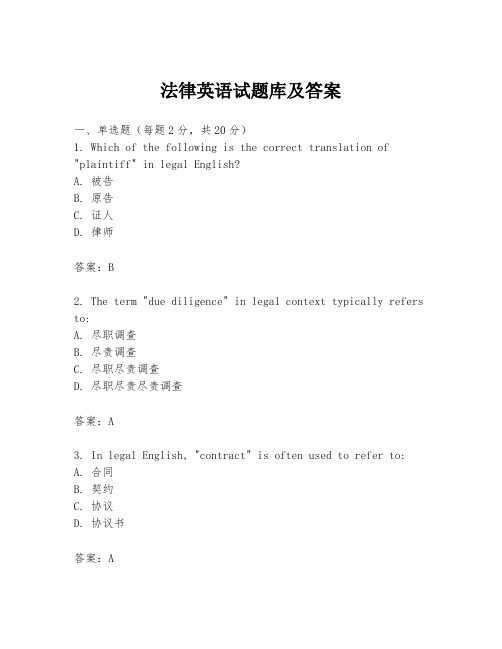
法律英语试题库及答案一、单选题(每题2分,共20分)1. Which of the following is the correct translation of "plaintiff" in legal English?A. 被告B. 原告C. 证人D. 律师答案:B2. The term "due diligence" in legal context typically refers to:A. 尽职调查B. 尽责调查C. 尽职尽责调查D. 尽职尽责尽责调查答案:A3. In legal English, "contract" is often used to refer to:A. 合同B. 契约C. 协议D. 协议书答案:A4. The phrase "in consideration of" is commonly used in legal documents to mean:A. 鉴于B. 考虑到C. 由于D. 因为答案:B5. Which of the following is not a type of intellectual property?A. 商标B. 专利C. 版权D. 商业秘密答案:D6. The term "tort" in legal English refers to:A. 侵权行为B. 犯罪行为C. 合同违约D. 民事纠纷答案:A7. "Jurisdiction" in legal English means:A. 管辖权B. 审判权C. 执行权D. 立法权答案:A8. The abbreviation "LLC" stands for:A. Limited Liability CompanyB. Limited Legal CompanyC. Legal Liability CompanyD. Legal Limited Company答案:A9. "Probate" in legal English refers to the process of:A. 遗嘱认证B. 遗嘱执行C. 遗嘱公证D. 遗嘱登记答案:A10. "Statute" in legal English is used to denote:A. 法规B. 法律C. 法令D. 条例答案:B二、填空题(每题2分,共20分)1. The legal term for a formal written statement submitted toa court is a(n) _____________.答案:brief2. A(n) _____________ is a legal document that outlines the terms and conditions of a contract.答案:agreement3. The process of challenging the validity of a will is known as _____________.答案:contest4. A(n) _____________ is a legal professional who represents clients in court.答案:attorney5. The term _____________ refers to the legal principle that no one may profit from their own wrongdoing.答案:unclean hands6. A(n) _____________ is a legal document that grants a person the authority to act on behalf of another.答案:power of attorney7. The legal term for a formal written request to a court is a(n) _____________.答案:petition8. A(n) _____________ is a legal document that provides evidence of a debt.答案:promissory note9. The legal term for a formal written order from a court is a(n) _____________.答案:decree10. A(n) _____________ is a legal document that outlines the terms and conditions of a sale of real estate.答案:deed三、判断题(每题2分,共20分)1. The term "lien" in legal English refers to a legal claim on property to secure the payment of a debt. (对/错)答案:对2. "Negligence" in legal English means the failure to exercise reasonable care, resulting in harm to another. (对/错)答案:对3. "Indemnity" in legal English refers to the right to be compensated for a loss or damage suffered. (对/错)答案:对4. A "writ" is a legal document issued by a court that ordersa person to do or refrain from doing a specific act. (对/错) 答案:对5. "Affidavit" in legal English is a written statement of facts voluntarily made by a person under oath. (对/错)答案:对6. "Misdemeanor" in legal English refers to a less serious crime than a felony. (对/错)答案:对7. "Arbitration" is a form of alternative dispute resolution where a neutral third party makes a binding decision. (对/错) 答案:对8. "Eminent domain" refers to the power of the government to take private property for public use without compensation. (对/错)答案:错9. "Venue" in legal English refers to the geographical location where a legal action is brought. (对/错)答案:对10. "Custody" in。
- 1、下载文档前请自行甄别文档内容的完整性,平台不提供额外的编辑、内容补充、找答案等附加服务。
- 2、"仅部分预览"的文档,不可在线预览部分如存在完整性等问题,可反馈申请退款(可完整预览的文档不适用该条件!)。
- 3、如文档侵犯您的权益,请联系客服反馈,我们会尽快为您处理(人工客服工作时间:9:00-18:30)。
12法律英语三习题题库
mportant in your view?
4.If a lawyer knows much about law but very little about anything els e, will he be a good lawyer?
复习题
1.the process of engaging a lawyer
2.the classification of Lawyers in America
练习题
✶Translate the following legal terms:Legal Profession
✶Multistate Bar Exam
✶federal courts
✶boards of directors
✶Judge
✶Attorney General
✶Chief Justice
✶Barristers
✶Solicitors
✶Attorney
✶practice of law
✶Lawyers in private practice
✶single practitioner
✶house Counsel
✶corporate counsel
✶public prosecutor
✶Federal prosecutor
✶district attorney
✶Congress of the United States
✶The United States Department of Justice
Lesson Three Legal Education
预习题
1. What is the only way to prepare for membership in the legal profession in the US?
2. What are the main functions of law schools in the US?
3. What are the merits and demerits of case method in teaching law?
4. What does legal hierarchy mean?
复习题
1. To be clear about the curriculum of American legal education
2. To distinguish the case method from lecture method
3. What are the merits and demerits of case method in teaching law? 练习题
翻译P4 PARA 8& P12-13 PARA5-7
Lesson Four Judicial System
预习题
1. How many court systems are there in the United States? And what are they?
2. How many judges generally are there in a federal district court?
3. How are state court judges usually selected?
复习题
1. About the American court system and English court system
2. Distinguish between trial courts and appellate courts
3. about the position of the Judges in court
练习题
1. Translation. •The Supreme Court, •Courts of Appeals, •
District Courts, • Special courts, •Three-tiered model: Trail Court, Circuit Court, Appellate Court, Court of Appeals, Supreme Court
2. Dictation P4
3.
Lesson 5 Constitution
预习题
1. What was the first American Constitution?
2. How to understand constitutional supremacy?
3. What are the three branches of US? Government and how to understand separation of powers?
4. What is the impeachment policy and how many presidents are
impeached?
5. How to change the Constitution?
6) What is the checks and balances policy?
复习题
1.the feature of the US Constitution
2.the fundamental principles of government
3.the provisions for amendment
练习题
1. What do you think about the separation of powers in the United States?
2. How much do you know about the process of impeachment?
3. What’s your view on the U.S. citizens’ right to bear arms?
Lesson Six Administrative Law
预习题
1.What is administrative law?
2.What is the scope of administrative law?
3.What is agency action?
4.What are the models of administrative law?
复习题
1. The definition of “agency” in the Federal Administrative Procedure
2. The functions of regulatory agencies and non-regulatory agencies 练习题
1. Questions about the text P69.
2. Dictation
Lesson 7 Criminal Law
预习题
1.What kinds of crimes do you know?
2.How much do you know about killing?
3.What is capital punishment?
4.Who gives a sentence to the criminals?
复习题
1. What’s your viewpoint of the insanity defense? Should an insane person be liable for his killing of a victim?
2. Do you think abortion is justifiable or not? Should we label the killing of a fetus murder?
3. Should death penalty be abolished in China?
练习题
Translation of the legal terms.
Lesson 9 Contract Law
预习题
1.What is a contract?
2.What can people do with contracts?
复习题
1 .What is a contract?
2. What acts are criminal but not tortious?
3.What acts are tortious but not criminal?
练习题
Translation of the legal terms.
Lesson 10 Tort Law
预习题
⏹What is tort law?
⏹What is an intentional tort?
⏹How to decide the liability for negligence?
⏹What is the No-Fault Principle?
复习题
Intentional torts
Liability for negligence
练习题
1.What is the common characteristic of the behaviors defined as civil wrongs?
2. Which category of civil wrongs has not grown rapidly in the 20th century?
3. As for the product liability, to whom the court judgments are favorable in the 20th century?
4. According to the text, what is the fundamental concept of tort law?。
